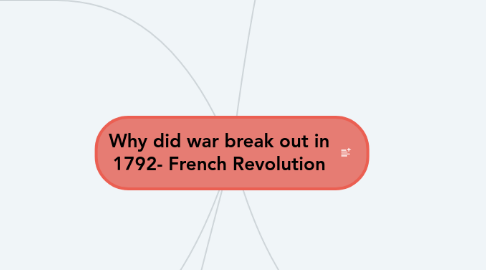
1. The Austrian Committee
1.1. Support for the War
1.1.1. In France, people came to believe that war was in their own best interest or those in France
1.1.2. Marie Antoinette wrote to her brother, the Emperor Leopold II in Sept 1791. She said that 'conciliation was out of the question', and that only 'armed force can put things right'.
1.1.3. Marie Antoinette hoped for a war in which France would be defeated- enabling Louis to recover his old powers. The King shared her view- he argued that it was inevitable that it would be defeated as 'The physical condition and morale of France, is such that it will be unable to sustain even half a campaign'.
1.2. Opposition faced.
1.2.1. The deputies were not convinced
1.2.2. Widespread rumours that the country's foreign policy was being run by an 'Austrian Committee'- headed by Marie Antoinette
1.2.3. Secret agents being sent to Koblenz( the headquarters of the émigrés) and Vienna to plot a counter revolution.
2. French Army commanders wanted war
2.1. Army commanders such as Lafayette and Dumouriez, also wanted war
2.1.1. Lafayette
2.1.1.1. First commander of the National Guard- brought the King from Versailles to Paris during the October Days- was responsible for the Champ de Mars massacre
2.1.1.2. Desire for War?- He had become disillusioned by the failure of the revolution to produce political stability. He wanted the power of the King strengtened.
2.1.1.2.1. Though that this could be done by waging a 'short successful war against Austria'. Believed it would increase his prestige as a General
2.1.1.2.2. This would also enable him to dictate his own terms to both the King and the Assembly
2.1.2. Dumouriez
3. Opposition to War
3.1. Robespierre
3.1.1. Most deputies were won over by Brissots
3.1.2. Argued that the Real threat came from soldiers like Lafayette who were still popular enough to mislead the public.
3.1.3. Believed that the aim of the European powers were to intimidate, not attack France.
3.2. Quotes
3.2.1. ' You propose to give supreme power to those who most want your ruin'
3.2.2. 'wage war in the right way, on our enemies at home, instead of marching under their orders against their allies across the frontiers'.
4. The Declaration of Pillnitz 1791
4.1. 1. A result of the flight of Varennes
4.1.1. - Support for a new republic started to grow, while the popularity of the King declined
4.1.1.1. on 24th June 30,000 people marched to the National Assembly in support of a petition from the Cordeliers Club calling for the King's dismissal from office
4.1.2. In the declaration it is obvious that Louis failed to understand the popularity of the changes which has taken place since 1789
4.1.3. Once again, the french people would have to make choices that many of them would have preferred to avoid- Civil constitution of the Clergy
4.1.4. The credibility of the new constitution was undermined before it had even been implemented
4.1.5. In Louis' declaration he had emphatically renounced the revolution. Could he continued to remain as head of state
4.2. 2. Austrians and Prussians felt that they had to make some gesture in support of Louis- in the form of a public declaration
4.2.1. - Extent of support from the Monarchy. The other European monarchies understood that the present position of the King of France was a 'concern to all sovereigns in Europe'
4.2.1.1. Source A: States that the monarchies would co-operate by employing in proportion to their forces in an effort for King Louis to consolidate power and restore the monarchial government--> They would instruct their troops to prepare for active service
4.2.2. Significance: Appeared to be threat to interfere in French international affairs.
4.2.2.1. Enemies of the King- considered that the declaration justified their position and mistrust of the monarchy
4.2.2.2. In reality- No threat at all- since the Austrians knew that other powers such as Britain would not join them- unlikely to lead to any action
4.2.2.2.1. In France the Declaration did not create much of a stir. The assembly did not debate it and most newspapers ignored it.
4.2.2.2.2. When the Constitution was passed in September, Leopold showed no objection so the possibility of Austrian intervention was even more remote.
5. The Brissotins wanted war
5.1. Co-operation with Lafayette and his followers with the Brissotins
5.1.1. There were about 130 Girondins / 745 member legislative assembly. To obtain the majority they needed the support both of Lafayette and his followers
5.1.1.1. Brissot achieved this by waging a campaign calling for war which he began in October 1791- Main points in his case for war
5.1.1.1.1. 1. Successful conflict-rouse enthusiasm for revolution and show the permanence of the new regime
5.1.1.1.2. 2. War would allow France to extend revolutionary ideas abroad
5.1.1.1.3. 3. French armies would have support of their enemies own repressed subjects
5.1.1.1.4. 4. International situation favourable- european powers unlikely to unite against France- Russia preoccupied with Poland and Britain would not join unless directly threatened.
5.2. Jacques Brissot
5.2.1. Brissotins were followers of Jacques Brissot, one of the first politicians to support demands for a republic.
5.2.2. After the Flight to Varennes he argued for abolition of the Monarchy and for the trial of Louis XVI.
5.2.2.1. Saw that the King had not supported the constitution
5.2.2.2. Court plotting against the revolution and seeking the armed intervention of the European powers.
5.3. Why did they want war?
5.3.1. Believed that the war would force the King to reveal his true sympathies. Being either for or against the revolution.
5.3.2. Argued that it would expose any traitors who were opposed to the revolution
5.4. Difficulties face
5.4.1. War would be more difficult than Brissot expected because foreigners would not rise up to the support of the French invaders

